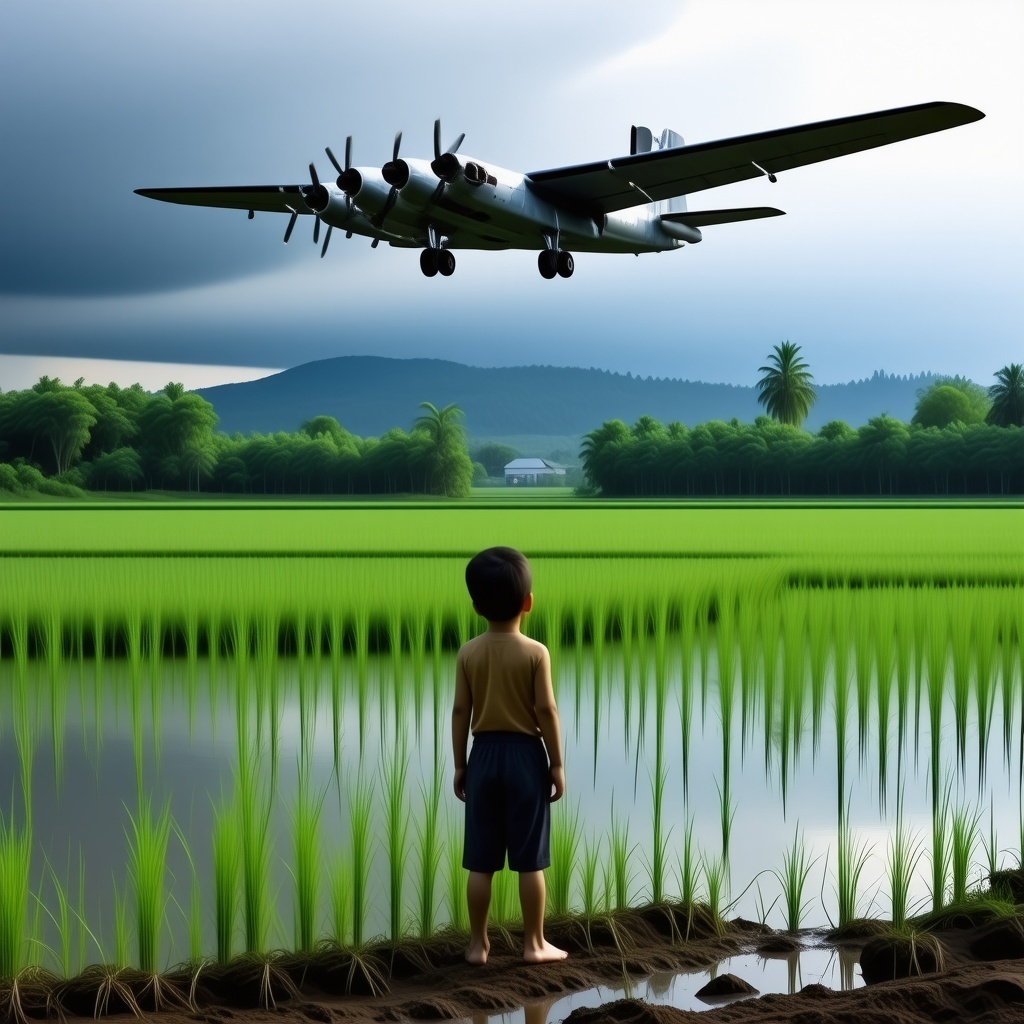The first time Chandan saw an airplane, he thought it was a mistake. A silver fish had lost its way from the river, wriggled too high, and now the sky had swallowed it. He stood in the middle of the paddy field, barefoot, the wet earth curling around his toes, and watched the speck disappear.
“Baba,” he asked, turning to his father, who was bent over the young rice stalks, hands deep in the soil. “Where is it going?”
His father barely looked up. “To a place where people have money.”
Chandan frowned. “Can we go there?”
His father gave him a look that was part amusement, part pity. “No, beta. That place is not for people like us.”
That night, as he lay on the cot under the open sky, he whispered to his younger sister, Neelu, “I want to fly one.”
She giggled, half-asleep. “You’re mad.”
But the sky did not laugh. It listened.
Majhauli was a place where boys grew into men who bent over fields, whose hands cracked with the seasons, whose dreams were small because small dreams were safer.
But Chandan was not made for safe dreams.
At seventeen, he packed his world into a torn bag—three shirts, a letter from his mother, and a hundred rupees. The bus to Patna smelled of sweat and hope, a mix of men leaving and men returning, their pockets heavier or their shoulders lower.
“Patna,” someone muttered behind him, “is where boys like us go to break or become steel.”
Chandan wanted to be steel.
He worked at a dhaba near the railway station, wiping tables, carrying steel trays heavy with rotis and dal, swallowing his hunger with leftover scraps. At night, he sat on the dhaba’s back steps, tracing English words in a stolen notebook, the dim light from the streetlamp flickering like a hesitant blessing.
“Why do you waste time on this?” asked Raju, the chaiwala’s son. “Even if you learn English, will they let you fly their planes?”
Chandan didn’t answer. He just looked up.
Every evening, he went to the airport’s boundary wall, gripping the rusted fence as he watched planes take off. He whispered their names like prayers—Indigo, Air India, Vistara.
Bhola Kaka, an old guard at the airport, often found him there. One night, as he chewed on a stale biscuit, he chuckled, “A village boy dreaming of flying? Even God will shake His head.”
Chandan smiled, his hands tightening on the fence. “Then I’ll make Him nod.”
Dreams, he learned, were not just built with hope. They were built with bruises.
The first time he took the English proficiency test, he failed. He sat on the hostel floor, staring at the red marks on his paper, the ink bleeding into his dreams.
The first time he applied for a pilot training scholarship, he was rejected.
The first time he stood in an interview room, surrounded by men in pressed suits and polished accents, they looked at his torn shoes and saw a joke.
By twenty-three, he had collected more failures than belongings.
One night, as he scrubbed the floor of an office in Delhi, he caught his reflection in the glass—tired eyes, cracked lips, fingers raw from chemicals.
“Maybe,” a voice inside him whispered, “they were right. Maybe this sky is not for you.”
For the first time in years, he let himself cry.
But the next morning, he picked up his books again.
Because Majhauli had taught him something—seasons change, but only for those who don’t stop planting.
The letter arrived when he had stopped expecting it.
"Selected for Pilot Training Program."
The words blurred as he read them again, and again, and again. He ran barefoot to the nearest phone booth, dialing home with shaking hands.
“Ma,” he choked, “I did it.”
And his mother, who had never understood his dream but had prayed for him anyway, whispered through her tears, “Then fly, beta. Fly so high they cannot pull you down.”
The first time he sat in a cockpit, his hands trembled over the controls. Captain Khanna, his instructor, studied him.
“You’re not what we usually get,” he said, voice unreadable.
Chandan met his gaze. “I know.”
Khanna leaned back. “Tell me, Chandan. What makes a farmer’s son think he can fly?”
Chandan looked at the sky outside, vast and waiting.
“Because I already have.”
And as the plane roared down the runway, lifting off the ground, Chandan felt no fear—only the weightless joy of a boy who had once stood in a paddy field, looking up.
Years later, a plane flew over Majhauli.
In the fields below, a little girl tugged at her father’s hand. “Baba, where does it go?”
Her father, a man with rough hands and a proud smile, lifted her onto his shoulders.
“To a place where people dare to dream.”
Somewhere above the clouds, Captain Chandan Kumar smiled.
Because impossible dreams?
They were just dreams that took a little longer to land.



 React
React
 React
React
 React
React
 React
React
 React
React